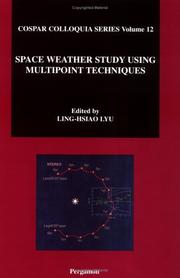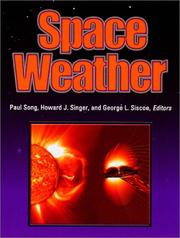| Listing 1 - 10 of 316 | << page >> |
Sort by
|

ISBN: 1281046132 9786611046132 0080541518 0080440576 9780080541518 9780080440576 Year: 2002 Publisher: Amsterdam Boston Pergamon
Abstract | Keywords | Export | Availability | Bookmark
 Loading...
Loading...Choose an application
- Reference Manager
- EndNote
- RefWorks (Direct export to RefWorks)
Magnetic storms may cause damage to satellites, radiation hazard to astronauts, disruption of radio communications, and interruption of ground electric power lines. Space weather prediction becomes an important issue to be addressed in the twenty-first century. International Solar Terrestrial Program (ISTP) employs five satellites to probe the solar wind and magnetosphere, providing valuable information for space weather prediction. The Asia-Pacific region is becoming one of the economic centers in the world. The continuous drive for scientific and technological progress in parallel is evidenc
Book
Year: 2023 Publisher: [Place of publication not identified] : MDPI - Multidisciplinary Digital Publishing Institute,
Abstract | Keywords | Export | Availability | Bookmark
 Loading...
Loading...Choose an application
- Reference Manager
- EndNote
- RefWorks (Direct export to RefWorks)
In the domain of electronic navigation, satellite navigation (GNSS) is one of the most important complex modern systems. GNSS is a key aspect of infrastructure which supports the development and improvement of power grid systems, banking operations, global transportation systems, and global communication systems. Today, GNSS requires the use of several positioning networks and sensors, such as radio networks and MEMS. The Earth's atmosphere, particularly the ionosphere and troposphere, can be seen as a huge laboratory where multiple processes and phenomena directly affecting the propagation of EM waves occur. Like all complex systems, GNSS technology has also gone through certain evolutionary stages. Factors affecting the future evolution of GNSS technology include the appearance of new signals and frequencies, complementary technologies in use, etc., but in the domain of GNSS technologies, it is essential to study the impact of space weather on GNSS systems. A key part of research related to GNSS technologies is the vertical TEC distribution and anomalies related to earthquakes and volcanic eruptions on Earth. There are many challenges that need to be addressed because they affect reliability, accuracy, and all other essential parameters of GNSS systems. It addresses some of these issues by publishing manuscripts which study GNSS risk assessment, different effects of space weather disturbances on the operation of GNSS systems, environmental impacts on the operation of GNSS systems, GNSS positioning error budgets, TEC special features in volcano eruptions, and similar topics.
Book
Year: 2018 Publisher: Washington : U.S. Government Publishing Office,
Abstract | Keywords | Export | Availability | Bookmark
 Loading...
Loading...Choose an application
- Reference Manager
- EndNote
- RefWorks (Direct export to RefWorks)
Book
Year: 2023 Publisher: [Place of publication not identified] : MDPI - Multidisciplinary Digital Publishing Institute,
Abstract | Keywords | Export | Availability | Bookmark
 Loading...
Loading...Choose an application
- Reference Manager
- EndNote
- RefWorks (Direct export to RefWorks)
In the domain of electronic navigation, satellite navigation (GNSS) is one of the most important complex modern systems. GNSS is a key aspect of infrastructure which supports the development and improvement of power grid systems, banking operations, global transportation systems, and global communication systems. Today, GNSS requires the use of several positioning networks and sensors, such as radio networks and MEMS. The Earth's atmosphere, particularly the ionosphere and troposphere, can be seen as a huge laboratory where multiple processes and phenomena directly affecting the propagation of EM waves occur. Like all complex systems, GNSS technology has also gone through certain evolutionary stages. Factors affecting the future evolution of GNSS technology include the appearance of new signals and frequencies, complementary technologies in use, etc., but in the domain of GNSS technologies, it is essential to study the impact of space weather on GNSS systems. A key part of research related to GNSS technologies is the vertical TEC distribution and anomalies related to earthquakes and volcanic eruptions on Earth. There are many challenges that need to be addressed because they affect reliability, accuracy, and all other essential parameters of GNSS systems. It addresses some of these issues by publishing manuscripts which study GNSS risk assessment, different effects of space weather disturbances on the operation of GNSS systems, environmental impacts on the operation of GNSS systems, GNSS positioning error budgets, TEC special features in volcano eruptions, and similar topics.
Book
Year: 2023 Publisher: [Place of publication not identified] : MDPI - Multidisciplinary Digital Publishing Institute,
Abstract | Keywords | Export | Availability | Bookmark
 Loading...
Loading...Choose an application
- Reference Manager
- EndNote
- RefWorks (Direct export to RefWorks)
In the domain of electronic navigation, satellite navigation (GNSS) is one of the most important complex modern systems. GNSS is a key aspect of infrastructure which supports the development and improvement of power grid systems, banking operations, global transportation systems, and global communication systems. Today, GNSS requires the use of several positioning networks and sensors, such as radio networks and MEMS. The Earth's atmosphere, particularly the ionosphere and troposphere, can be seen as a huge laboratory where multiple processes and phenomena directly affecting the propagation of EM waves occur. Like all complex systems, GNSS technology has also gone through certain evolutionary stages. Factors affecting the future evolution of GNSS technology include the appearance of new signals and frequencies, complementary technologies in use, etc., but in the domain of GNSS technologies, it is essential to study the impact of space weather on GNSS systems. A key part of research related to GNSS technologies is the vertical TEC distribution and anomalies related to earthquakes and volcanic eruptions on Earth. There are many challenges that need to be addressed because they affect reliability, accuracy, and all other essential parameters of GNSS systems. It addresses some of these issues by publishing manuscripts which study GNSS risk assessment, different effects of space weather disturbances on the operation of GNSS systems, environmental impacts on the operation of GNSS systems, GNSS positioning error budgets, TEC special features in volcano eruptions, and similar topics.

ISBN: 0875909841 9780875909844 Year: 2001 Publisher: Washington, DC American Geophysical Union
Abstract | Keywords | Export | Availability | Bookmark
 Loading...
Loading...Choose an application
- Reference Manager
- EndNote
- RefWorks (Direct export to RefWorks)
Book
Year: 2018 Publisher: Washington : U.S. Government Publishing Office,
Abstract | Keywords | Export | Availability | Bookmark
 Loading...
Loading...Choose an application
- Reference Manager
- EndNote
- RefWorks (Direct export to RefWorks)

ISBN: 1402012780 9781402012785 Year: 2003 Publisher: Dordrecht Kluwer Academic Publishers
Abstract | Keywords | Export | Availability | Bookmark
 Loading...
Loading...Choose an application
- Reference Manager
- EndNote
- RefWorks (Direct export to RefWorks)
Periodical
Abstract | Keywords | Export | Availability | Bookmark
 Loading...
Loading...Choose an application
- Reference Manager
- EndNote
- RefWorks (Direct export to RefWorks)
Periodical
Abstract | Keywords | Export | Availability | Bookmark
 Loading...
Loading...Choose an application
- Reference Manager
- EndNote
- RefWorks (Direct export to RefWorks)
| Listing 1 - 10 of 316 | << page >> |
Sort by
|

 Search
Search Feedback
Feedback About
About Help
Help News
News